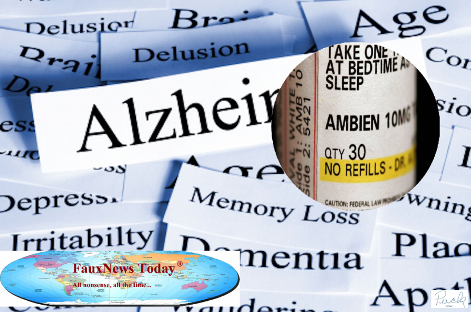 WASHINGTON, D.C. – A study and report that once pointed toward evidence that sleeping pills can increase the risk of Alzheimer’s now appears to have slipped the collective consciousness of the scientific and medical professions, as well as the pill-taking public in general. Recent random polls taken of the population at large have turned up almost zero recollection that the report ever existed.
WASHINGTON, D.C. – A study and report that once pointed toward evidence that sleeping pills can increase the risk of Alzheimer’s now appears to have slipped the collective consciousness of the scientific and medical professions, as well as the pill-taking public in general. Recent random polls taken of the population at large have turned up almost zero recollection that the report ever existed.
“You’re kidding!” scoffed Annabelle Clearmont, who admitted to being 26 when she was asked for a comment about the study while she was having a prescription filled for temazepam at her local pharmacy. “I’ve never heard that; and besides I need these little darlings to be able to get to sleep. Can’t think how my life would be without them.”
Sleeping pills, which are rarely called by that name anymore, are a class of drugs whose main function is to put people to sleep by doing a nasty little number on their brain functions. The pills are usually referred to now by quasi-medical terms such as hypnotics or soporifics to elevate them in status and their users in social self-importance, or, euphemistically as sleep aids or mild sedatives to give them the mistaken perception of benignity.
The results of the study, (which, ironically, has seemingly disappeared from public memory) of more than 3000 people indicated that the risk of dementia and Alzheimer’s for people taking sleeping pills was increased by more than 50% (dementia) and 60% (Alzheimer’s), compared with non-users.
As with smokers however, who live in denial right up until the time they get lung cancer and die from it, sleeping pill users are also quick to find ready rationalization to pop hypnotics.
When asked for comment about the possible harm to brain functions for people taking sleeping pills, Ryan Cernian, who said he was “on the right side of twenty-eight” and was filling a prescription for oxybutynin stated, “Sure, I had heard about it (the study), but I’m not worried because it was done on really old people.” Source: FNT Staff
Photo credit: Original images at: The Guardian , Polymer Solutions , The New Old Age